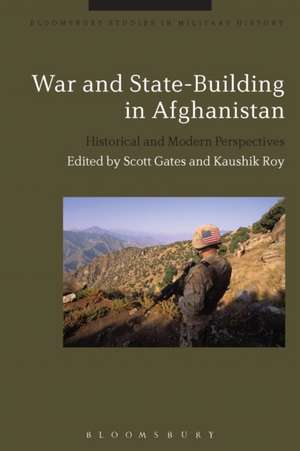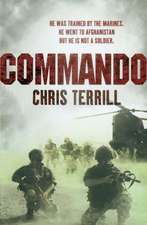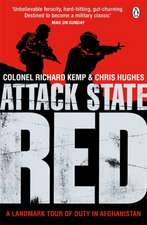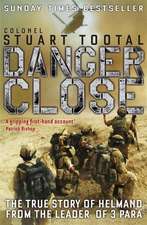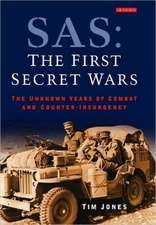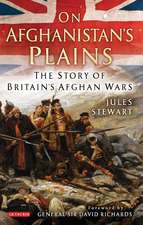War and State-Building in Afghanistan: Historical and Modern Perspectives: Bloomsbury Studies in Military History
Editat de Scott Gates, Dr Kaushik Royen Limba Engleză Paperback – 18 mai 2016
| Toate formatele și edițiile | Preț | Express |
|---|---|---|
| Paperback (1) | 259.16 lei 6-8 săpt. | |
| Bloomsbury Publishing – 18 mai 2016 | 259.16 lei 6-8 săpt. | |
| Hardback (1) | 775.51 lei 6-8 săpt. | |
| Bloomsbury Publishing – 19 noi 2014 | 775.51 lei 6-8 săpt. |
Din seria Bloomsbury Studies in Military History
- 14%
 Preț: 509.59 lei
Preț: 509.59 lei - 22%
 Preț: 257.68 lei
Preț: 257.68 lei - 22%
 Preț: 258.24 lei
Preț: 258.24 lei - 22%
 Preț: 258.42 lei
Preț: 258.42 lei - 13%
 Preț: 258.42 lei
Preț: 258.42 lei - 13%
 Preț: 258.77 lei
Preț: 258.77 lei - 13%
 Preț: 259.07 lei
Preț: 259.07 lei - 22%
 Preț: 238.76 lei
Preț: 238.76 lei - 22%
 Preț: 256.85 lei
Preț: 256.85 lei - 22%
 Preț: 258.77 lei
Preț: 258.77 lei - 23%
 Preț: 190.59 lei
Preț: 190.59 lei - 22%
 Preț: 257.68 lei
Preț: 257.68 lei - 22%
 Preț: 257.59 lei
Preț: 257.59 lei - 22%
 Preț: 257.97 lei
Preț: 257.97 lei - 13%
 Preț: 238.01 lei
Preț: 238.01 lei - 22%
 Preț: 834.70 lei
Preț: 834.70 lei - 18%
 Preț: 257.59 lei
Preț: 257.59 lei - 12%
 Preț: 259.42 lei
Preț: 259.42 lei - 22%
 Preț: 261.17 lei
Preț: 261.17 lei - 13%
 Preț: 258.42 lei
Preț: 258.42 lei - 22%
 Preț: 226.60 lei
Preț: 226.60 lei - 13%
 Preț: 223.10 lei
Preț: 223.10 lei
Preț: 259.16 lei
Preț vechi: 296.26 lei
-13% Nou
Puncte Express: 389
Preț estimativ în valută:
49.60€ • 53.85$ • 41.66£
49.60€ • 53.85$ • 41.66£
Carte tipărită la comandă
Livrare economică 22 aprilie-06 mai
Preluare comenzi: 021 569.72.76
Specificații
ISBN-13: 9781474286350
ISBN-10: 1474286356
Pagini: 320
Dimensiuni: 156 x 234 x 26 mm
Greutate: 0.45 kg
Ediția:NIPPOD
Editura: Bloomsbury Publishing
Colecția Bloomsbury Academic
Seria Bloomsbury Studies in Military History
Locul publicării:London, United Kingdom
ISBN-10: 1474286356
Pagini: 320
Dimensiuni: 156 x 234 x 26 mm
Greutate: 0.45 kg
Ediția:NIPPOD
Editura: Bloomsbury Publishing
Colecția Bloomsbury Academic
Seria Bloomsbury Studies in Military History
Locul publicării:London, United Kingdom
Caracteristici
Links past experiences to current challenges in Afghanistan, bringing new perspectives on contemporary policy
Notă biografică
Scott Gates is Professor of Political Science at the Norwegian University of Science and Technology and Research Professor at the Peace Research Institute Oslo, Norway.Kaushik Roy is Guru Nanak Professor in History at Jadavpur University, India and Global Fellow of the Peace Research Institute Oslo, Norway.
Cuprins
Introduction Scott Gates (Norwegian University of Science and Technology) and Kaushik Roy (Jadavpur University, India)1. The Unchanging Nature of Asymmetric Warfare Marianne Dahl (Peace Research Institute Oslo, Norway), Håvard Mokleiv Nygård (Peace Research Institute Oslo, Norway), Scott Gates and Kaushik Roy2. Great Mughals, Warfare and COIN in Afghanistan: 1520-1707 Kaushik Roy3. Counter-Insurgency and Empire: The British Experience with Afghanistan and the North-West Frontier, 1838-1947 John Ferris (University of Calgary, Canada)4. How Afghanistan Was Broken: The Disaster of the Soviet Intervention Pavel K. Baev (Centre for the Study of Civil War, Peace Research Institute Oslo, Norway)5. Mujahidin vs. Communists: Analysing the Mujahidin's war strategies after Soviet withdrawal from Afghanistan Anne Stenersen (Norwegian Defence Research Establishment)6. Explaining NATO's limitations and the Taliban's Resilience Abdulkader H. Sinno (Indiana University, Bloomington, USA)7. Regional Dimensions Kristian Harpviken (Peace Research Institute, Oslo, Norway)8. The Afghan National Army and Counter-Insurgency Robert Johnson (University of Oxford, UK)9. The Country as a Hole: Imagined States and the Failure of Counterinsurgency in AfghanistanIvan Arreguín-Toft (Boston University, USA)Index
Recenzii
Studies of contemporary conflict in Afghanistan can lack historical perspective or be popularised to an unhelpful degree. The broad historical sweep of this volume from the Mughals to the current NATO deployment places the Afghanistan situation in its proper historical context as well as pointing to its potential future in the context of Afghan (as opposed to Western) military history.
This is a timely and wide-ranging collection which offers varied, and valuable, perspectives on the relationship between war and the state in modern Afghan history. While confirming the long heritage of Afghan resistance, the essays also suggest some of the limits which have constrained thinking about insurgency, conflict and state-building in the country. Drawing on a variety of disciplinary approaches, this volume may usefully be read by those concerned with Afghanistan's past, present and future, as well as by those with interests in the evolution of strategic and operational doctrine.
At the beginning of this innovative analysis of conflict in Afghanistan, Scott Gates and Kaushik Roy ask why another book on Afghanistan? The answer is self-evident: Afghanistan remains poorly understood, and the character of conflict in Afghanistan also remains poorly understood. In this wide-ranging analysis of some six hundred years of conflict in Afghanistan, Gates and Roy, along with a host of experts in Afghan military history, examine why repeated efforts - from the Muhgals to Western forces in the form of ISAF - have failed to subdue the country. In so doing, they explore conflict in new ways, in terms that will be familiar to practitioners, but rarely explained in such an engaging form. They do so by deploying a resource frequently overlooked by practitioners and political analysts alike: the diverse and bloody history of one of the world's most fought over lands. This is history at its most relevant.
This is a timely and wide-ranging collection which offers varied, and valuable, perspectives on the relationship between war and the state in modern Afghan history. While confirming the long heritage of Afghan resistance, the essays also suggest some of the limits which have constrained thinking about insurgency, conflict and state-building in the country. Drawing on a variety of disciplinary approaches, this volume may usefully be read by those concerned with Afghanistan's past, present and future, as well as by those with interests in the evolution of strategic and operational doctrine.
At the beginning of this innovative analysis of conflict in Afghanistan, Scott Gates and Kaushik Roy ask why another book on Afghanistan? The answer is self-evident: Afghanistan remains poorly understood, and the character of conflict in Afghanistan also remains poorly understood. In this wide-ranging analysis of some six hundred years of conflict in Afghanistan, Gates and Roy, along with a host of experts in Afghan military history, examine why repeated efforts - from the Muhgals to Western forces in the form of ISAF - have failed to subdue the country. In so doing, they explore conflict in new ways, in terms that will be familiar to practitioners, but rarely explained in such an engaging form. They do so by deploying a resource frequently overlooked by practitioners and political analysts alike: the diverse and bloody history of one of the world's most fought over lands. This is history at its most relevant.
